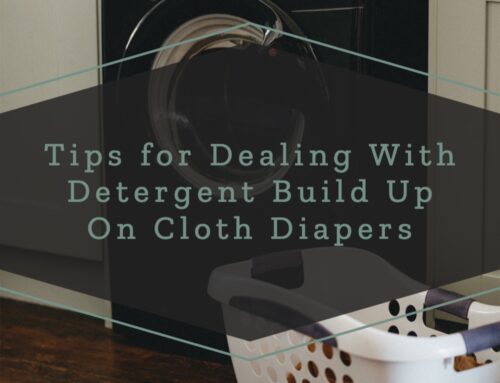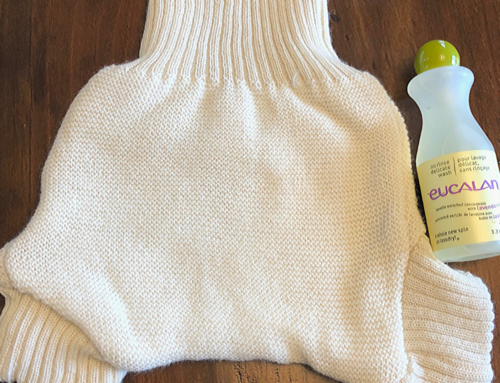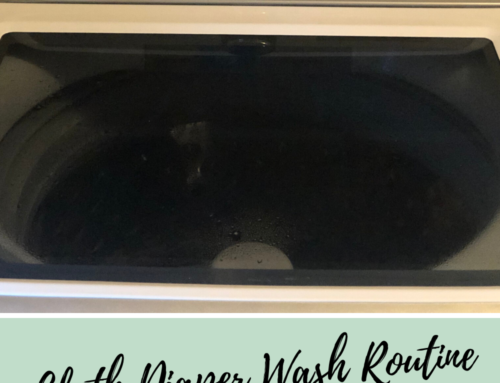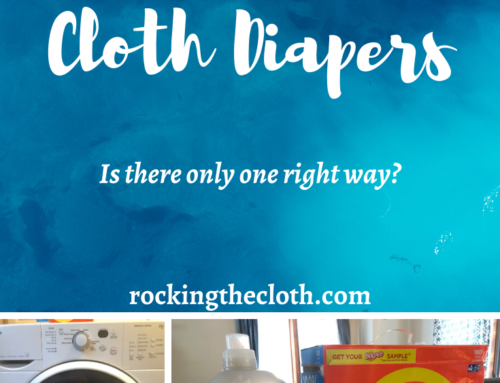“How to Navigate Hard Water when Washing Cloth Diapers” may contain affiliate links.
When parents start looking into cloth diapers, many are turned off by how overwhelming it can seem. Washing cloth diapers is probably the most confusing part of the whole ordeal, and for most people that end up deciding not to use cloth diapers, I’m willing to bet that most of the time it is due to intimidation surrounding the washing process.
Are cloth diapers really hard to wash? Most of the time, no.
Can it be hard to figure out how to wash them? Sometimes. The cloth diaper community has some divide when it comes to washing–on one hand, you have the people that have a 10 step washing process with routine strips to keep their diapers in top shape. On the other hand, you have people that maybe just do a tweak here and there from a regular clothes washing routine to accommodate the heavy soil of their diapers.
Who is doing it correctly? My opinion is the latter group.
Here is the deal: cloth diapers do function a little differently from regular laundry, and we do want to maintain their absorbency and protect them when washing. However, they are still clothes. What that means is we really don’t need to over-complicate this.
If you want a common-sense Cloth Diaper Washing Instructions PDF, click here to sign up for my email list and receive one for free!
What to Keep in Mind When Washing Diapers
There are a few things we want to be cognizant of when washing diapers over other loads of laundry:
- No fabric softeners (they make clothing less absorbent–not a big deal for your t-shirts, but definitely a big deal for diapers!)
- Warm/hot washes are good, but super hot cycles (like sanitation) could damage the PUL on your diapers and wear out the elastics faster
- Use a quality detergent that can handle human waste (this means no homemade laundry soaps–sorry, they just will not clean off waste the way a true detergent will)
- Use an appropriate amount of water–not too much, not too little.
Those are the main things you need to keep in mind. However, now and then you hear about water hardness being an issue, and you may read about people adding extra things besides detergent to their laundry. What is this about?
What Is The Problem With Hard Water?
Hard water can certainly be problematic, but it is problematic for more than just diapers. It can dry out your skin, wear out appliances (like washing machine and dishwasher) much faster, and cause mineral buildup on faucets. It can also affect the efficacy of detergents or cause mineral build up on clothing (such as diapers).
Mineral buildup on diapers can also negatively impact absorbency.
However, 85{9994046f29331ee04cc0b5e07eb28364315ea03ccc2f01b5a43e8b85b372d1e9} of the United States has hard water. Does that mean 85{9994046f29331ee04cc0b5e07eb28364315ea03ccc2f01b5a43e8b85b372d1e9} of the cloth diaper community is putting additives in their laundry or otherwise dealing with issues? Nope!
There are varying levels of water hardness, and while extremely hard water can certainly cause problems, there are more variables to consider.
Many people order test strips from the internet or bring water samples places to get their water hardness tested, and then they meticulously measure out exactly how much water softener to add based on results. Is that really necessary?
Should I Test My Water? How Do I Know If It Is Hard?
Here’s the thing: hard water isn’t a secret. You may have hard water if you have:
- Mineral buildup around faucets or spouts
- Soap scum that builds up in your shower
- Dry skin
- Your clothing is dull or itchy
- You have water spots on dishes after washing in the dishwasher
- Your appliances break down faster
If you have any of those things, you are part of the 85{9994046f29331ee04cc0b5e07eb28364315ea03ccc2f01b5a43e8b85b372d1e9} of the US that has hard water. But most of the time, hard water on an average level doesn’t require remediation. Most detergents have water softeners added. More on this later.
What If My Water Is Extremely Hard?
If you know your water falls in the “Extremely Hard” category, it may be worth testing. As a starting point, your city’s water hardness should be available online–my own city’s water hardness level was found easily with a Google search, and if you’re curious, it is indeed “extremely hard.”
The water that comes into your house may be harder than that depending on your pipe situation. However, I do not think you need to get carried away with the (probably nominal) difference. So many people act like washing cloth diapers is a sensitive chemistry experiment that will go all wrong if you don’t know your water hardness to the exact number.
For the VAST majority of people, it is not nearly that sensitive. And honestly, most people that have washing issues are getting their advice from cloth diapering Facebook groups that say THIS IS THE ONLY WAY TO WASH DIAPERS and if your water is hard YOU MUST DO XYZ!
Well, those are the people I see having problems over and over again because they are too reliant on random Facebook admin telling them what to do even though those people have never used their machine or been in their situation.
But at the end of the day, buying a pack of test strips on Amazon is cheap, so go ahead if you know your water is super hard, or if it gives you peace of mind.
When Do I Need To Add A Softener?
Before deciding to add a water softener, test your water hardness. Do not start adding softeners (Borax/Calgon) unless you actually know your water hardness number. Slightly to medium-hard water does not require softeners most of the time, and honestly, they will cause more problems than they solve for most people. Don’t just assume you need to be adding them. They’re costly and can cause your washing machine to sud up drastically.
Next, consider your detergent choice. If you are using a plant-based “eco-friendly” detergent in hard water, a water softening agent might be worth it since they have very few softeners in the detergent itself. However, neither Calgon nor Borax is “natural,” so you will have to decide for yourself if it makes sense to insist on using a plant-based detergent and then have to add one of those to it.
Many commercial powder detergents (like Tide and Gain) already have water softeners added in them! For many families, these are enough and adding more softener is not necessary.
Before we started cloth diapering, we used the cheapest laundry detergent we could get–so usually whatever was on sale. However, once we started researching cloth diapers and getting a plan in place, I committed to using Tide Original Powder because it seemed like it was the go-to detergent in the cloth diapering community, and it seemed to be the “cure-all” for many cloth diaper issues. I just wanted to be proactive and avoid issues as much as possible.
I will say, Tide Original Powder has never failed me once. It definitely lived up to the hype. It has been 6 years of cloth diapering now, and while I have tried out other detergents here and there and they all worked well and fine, Tide Original Powder is still my top recommendation. I have used it with hard water at my old house and soft water (0 ppm) in my new house. It has been what works the best with both hard and soft in my experience.
If you do not want to use a powder detergent with water softeners already added (or if your water is extraordinarily hard), adding a separate water softener to your laundry can be a good idea as long as your water is actually hard enough to warrant it–if it’s not, super soft water can actually cause MORE problems than hard water. Don’t just start adding a softener (like Calgon or Borax) willy nilly.
If You Are Going to Use a Softener Additive…
Test your water first.
Honestly, super soft water (which is easily achieved with a water softening agent) is MORE problematic than hard water. It will cause your detergent to over sud, which is an issue with HE machines. It will require MORE water to get the detergent rinsed out properly. It overcomplicates most diaper washing routines.
If you do really need one, the most common water softeners are Calgon and Borax. Most diaper manufacturers recommend Calgon over Borax, but either one would work. Borax has been known to be irritating to some people, so that’s important to keep in mind if your family has any sensitivities.
What If I Have Hard Water Build Up On My Diapers?
If you know you have very hard water, have been washing your diapers without softeners and your diapers feel crunchy and don’t appear to be absorbing well, it could very well mean you have a mineral buildup. The answer at that point is to perform a strip.
Many people like to use something called RLR (see here for more info) to strip their diapers. Some people also just do a wash cycle with RLR instead of a soak. Each situation will be different.
In my opinion, it makes more sense (and is definitely more cost-effective) to do an occasional strip for hard water every few months than to buy expensive water softener additives (which have been known to cause detergent build-up and can be hard to find in some locations). That is my opinion and not everyone agrees. For what it’s worth, I washed in hard water the first 5 years and never once needed to do a strip or an RLR wash.
In conclusion, hard water can be a nuisance sometimes, but it doesn’t have to over-complicate your cloth diapering experience. Most people with hard water can get by with a good quality detergent (powder if water is very hard), and for those that struggle beyond that, Calgon or Borax are good options to consider.
Do you have hard water? How do you wash your diapers? If you don’t have diapers to wash yet, do you have a plan in place or have any questions? Let me know in the comments!







Hi Holly,
I used to use cloth diapers for my son when he was younger. But I didn’t realize that there’s hard and soft water, lol!
Was happy we didn’t encounter problems with that.
It was not really hard washing cloth diapers.
We were doing it so we don’t overspend on buying disposable diapers.
That was a long time ago, my son is now a teen.
But if we go back, we will still use cloth diapers.
Marita
Hi Marita! I think you bring up a great point that this may be one of those things we are overthinking nowadays. While it can cause problems for some people at times, most people are probably washing their diapers in hard water and not even realizing it could be problematic and getting on just fine, lol!
This is very beneficial to me even as I plan for the near future, I learned just now that fabric softeners should not be used as they tend to make the fabric of the cloth diaper weak and thereby reduce its absorption level and once this happens, the whole aim of the cloth diaper is defeated. I have also been corrected of the notion that extra hot water would be best for a cloth diaper.
Glad you found it helpful!